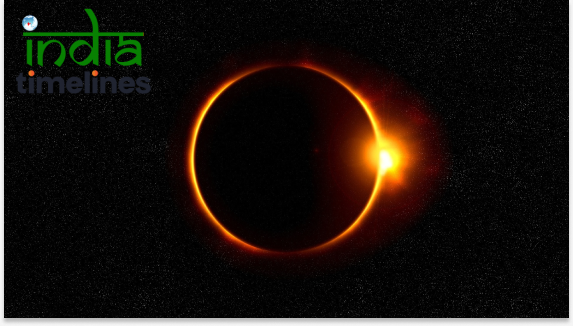
An annular solar eclipse, also known as the “ring of fire” eclipse, is a stunning celestial event that captures the attention of sky watchers around the globe. In 2024, one such eclipse is set to occur, offering a mesmerizing view to those in certain parts of the world. Unfortunately, for those in India, this spectacular event won’t be visible. In this article, we will explore why this particular “ring of fire” solar eclipse won’t be seen in India and discuss the science behind it.
What Is an Annular Solar Eclipse?
Before we dive into why this eclipse won’t be visible in India, let’s first understand what an annular solar eclipse is. During a solar eclipse, the moon comes between the Earth and the sun, casting a shadow on the Earth and blocking the sun’s light. However, an annular solar eclipse occurs when the moon is farther from Earth in its orbit. This makes the moon appear smaller in the sky, so it doesn’t completely cover the sun. Instead, a thin ring of sunlight remains visible around the edges of the moon, creating the “ring of fire” effect.
Annular Solar Eclipse 2024: Date and Path
The annular solar eclipse of 2024 is expected to take place on October 2, 2024. The path of the eclipse will pass over parts of North America, including the United States, Mexico, and several Central and South American countries. It will provide viewers in these areas a perfect opportunity to witness the captivating “ring of fire” phenomenon as the moon aligns with the sun.
However, this path of totality (the area where the full annular eclipse is visible) will not pass over India, or anywhere close to it.
Why the ‘Ring of Fire’ Solar Eclipse Won’t Be Visible in India
1. Path of the Eclipse
The primary reason the annular solar eclipse won’t be visible in India is its path. Solar eclipses are only visible in certain parts of the world where the moon’s shadow touches the Earth. In the case of the October 2024 eclipse, the path of the annular eclipse will be far from India. It will stretch across parts of North and South America, completely missing the Indian subcontinent.
2. Time Zone Difference
Another factor that impacts the visibility of the eclipse in India is the time zone. The eclipse is expected to occur during daylight hours in the western hemisphere, particularly in North and South America. Due to the significant time difference between India and these regions, the event will take place when it is nighttime in India, making it impossible to observe.
3. Geographical Position
Geographical location plays a crucial role in determining where a solar eclipse can be viewed. India, being on the eastern side of the globe, is not positioned along the eclipse’s trajectory for this event. The moon’s shadow will pass far west of India, making it inaccessible for observation.
Where Will the Annular Solar Eclipse Be Visible?
While India misses out on this celestial event, parts of the world will have the opportunity to witness the eclipse in all its glory. Some of the key locations where the annular solar eclipse of 2024 will be visible include:
- United States: From Oregon to Texas, viewers will experience the full “ring of fire.”
- Mexico: Northern parts of Mexico will also fall under the path of the eclipse.
- Central America: Countries like Honduras, Nicaragua, and Panama will be able to observe the eclipse.
- South America: Parts of Colombia and Brazil will witness the tail end of the eclipse.
In these regions, the eclipse will create a spectacular sight as the moon covers most of the sun, leaving a brilliant ring of sunlight around its edges.
What Type of Solar Eclipses Are Visible in India?
While the 2024 annular eclipse won’t be visible in India, the country does experience other types of solar eclipses from time to time. India has been fortunate to witness both total solar eclipses and partial solar eclipses in the past. The most recent solar eclipse visible in India occurred on June 21, 2020, when parts of the country were treated to an annular solar eclipse.
India is also expected to witness future partial solar eclipses, though the spectacular “ring of fire” won’t make an appearance in the near future.
Safety Precautions for Viewing Solar Eclipses
Even though India won’t witness the 2024 annular eclipse, it’s important to always take precautions when viewing any type of solar eclipse. Staring directly at the sun during an eclipse can cause serious eye damage. To safely observe a solar eclipse, use specially designed eclipse glasses or solar filters for telescopes.
When Is the Next Solar Eclipse Visible in India?
For those in India eagerly waiting for the next solar eclipse, the good news is that there are future eclipses that will be visible in the country. The next significant solar eclipse visible in India is expected to be a partial solar eclipse in 2025. While it won’t be as spectacular as the “ring of fire,” it will still offer a beautiful celestial show.
Conclusion
The annular solar eclipse of 2024, with its stunning “ring of fire” effect, will captivate viewers in the western hemisphere, particularly in parts of North and South America. However, due to the path of the eclipse and India’s geographical position, this event will not be visible in the country. While India may miss out on this one, the country has experienced, and will continue to experience, other types of eclipses in the future. For now, Indian stargazers will have to look forward to future celestial events.
5 FAQs about Solar Eclipses
- Why can’t India see the 2024 annular solar eclipse?
India is not in the path of the eclipse, and the event will take place when it’s nighttime in the country. - What is the ‘ring of fire’ in an annular solar eclipse?
The “ring of fire” occurs when the moon covers the center of the sun but leaves a bright ring of sunlight around its edges. - When is the next solar eclipse visible in India?
The next solar eclipse visible in India will be a partial solar eclipse in 2025. - Can I watch a solar eclipse without any eye protection?
No, watching a solar eclipse without proper eye protection can cause severe eye damage. Always use eclipse glasses or solar filters. - Will India ever see another ‘ring of fire’ eclipse?
Yes, India will experience another annular eclipse in the future, but the exact date depends on the path of future eclipses.































